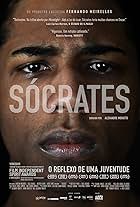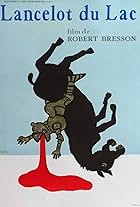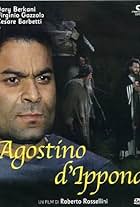A false accusation leads the philosopher Socrates to trial and condemnation in 4th century BC Athens.A false accusation leads the philosopher Socrates to trial and condemnation in 4th century BC Athens.A false accusation leads the philosopher Socrates to trial and condemnation in 4th century BC Athens.
Anne Caprile
- Santippe
- (as Anna Caprile)
Giuseppe Mannajuolo
- Apollodoro
- (as Bepy Mannaiuolo)
Antonio Alfonso
- Eutifrone
- (uncredited)
Iván Almagro
- Ermogene
- (uncredited)
Román Ariznavarreta
- Calicle
- (uncredited)
Simón Arriaga
- Servitore della cicuta
- (uncredited)
Bernardo Ballester
- Teofrasto
- (uncredited)
Ángel Blanco
- Efigene
- (uncredited)
César Bonet
- Prete
- (uncredited)
Roberto Cruz
- Un vecchio
- (uncredited)
Jean-Dominique de la Rochefoucauld
- Fedro
- (uncredited)
Featured reviews
THIS is a masterpiece. JEAN SILVERE was a revelation. Also, ANNE CAPRILE, his wife, was superbly wrought. So perfect was SILVÈRE's portrayal, that for me, he became SOCRATES.
I was wary, however, in the beginning, because the conversations went by so quickly. But now I understand what was going on and, as the story progressed, I became absolutely engrossed in this great, tragic story of one of history's great martyrs of truth.
I was moved, and I am not ashamed to say, literally to tears, during the last somber scene. I must now praise ROSSELLINI's direction. It gave me a more solid understanding of those times.
Also, the serious and unobtrusive musical score, which pulsated on had a drone-like quality which disappointed me at first, but again, as the story progressed, I understood why it was composed in this manner. It gave this work of art, the final touch of perfection.
This needs to be seen by a wider audience. I hope it will, in time, be required viewing in all the halls of education, everywhere.
I shall never forget it.
I was wary, however, in the beginning, because the conversations went by so quickly. But now I understand what was going on and, as the story progressed, I became absolutely engrossed in this great, tragic story of one of history's great martyrs of truth.
I was moved, and I am not ashamed to say, literally to tears, during the last somber scene. I must now praise ROSSELLINI's direction. It gave me a more solid understanding of those times.
Also, the serious and unobtrusive musical score, which pulsated on had a drone-like quality which disappointed me at first, but again, as the story progressed, I understood why it was composed in this manner. It gave this work of art, the final touch of perfection.
This needs to be seen by a wider audience. I hope it will, in time, be required viewing in all the halls of education, everywhere.
I shall never forget it.
In the first part of Socrate, Rossellini crams too many historical events for a one hour time span. This results in the characters themselves explaining too much to fill in the gaps for the viewer. The rest of the time we watch Socrates as he strolls around with his students, reciting his most overused quotes.
The second part, which is essentially Socrates' apology and his last days, feels almost like a different film in pace and gravity. But Plato's Apology of Socrates is ready-made material to ensure a great, dramatic scene. Another flaw is the awkward contrast between the professional actors playing Socrates and his wife Xanthippe against the rest of the characters, who are non-actors (a common practice in the neo-realist era of Italian cinema). For example, Meletus - Socrates' main accuser - seems completely inept at the crucial scene of the trial, like some teenage urchin that the director picked up from the street a few hours before filming.
On the positive side, it is refreshing to actually hear Mediterranean sounds for once in a film about Ancient Greece. Crickets and random dog barking are natural sounds still heard in Greece. It is not a small detail, as it works to create a strong sence of time and place. All and all, the film is watchable, albeit with quite a few flaws.
The second part, which is essentially Socrates' apology and his last days, feels almost like a different film in pace and gravity. But Plato's Apology of Socrates is ready-made material to ensure a great, dramatic scene. Another flaw is the awkward contrast between the professional actors playing Socrates and his wife Xanthippe against the rest of the characters, who are non-actors (a common practice in the neo-realist era of Italian cinema). For example, Meletus - Socrates' main accuser - seems completely inept at the crucial scene of the trial, like some teenage urchin that the director picked up from the street a few hours before filming.
On the positive side, it is refreshing to actually hear Mediterranean sounds for once in a film about Ancient Greece. Crickets and random dog barking are natural sounds still heard in Greece. It is not a small detail, as it works to create a strong sence of time and place. All and all, the film is watchable, albeit with quite a few flaws.
Boy is this film bad. It consists of talking heads going back and forth, talking about people we haven't met or even know about. It's all Greek to me, but it's Italian, and for a goodly portion of the film it looks like it's been dubbed, which it hasn't. I guess the track is off kilter.
The language itself is pure modern, with almost no hints of the true nature of Greek speech in 400 BC. And none of the beauty of Socrates speeches.
It was so bad I didn't see it through to the end. So maybe it got a lot better after the first 30 minutes.
The language itself is pure modern, with almost no hints of the true nature of Greek speech in 400 BC. And none of the beauty of Socrates speeches.
It was so bad I didn't see it through to the end. So maybe it got a lot better after the first 30 minutes.
Apart from his feature films,Italian director Roberto Rossellini was famous for some of his films which were made for television.It was in these films that he told the stories of some of the greatest philosophers who took birth on earth. Among these films one can mention the names of films about Blaise Pascal,Saint Augustine,René Descartes and Socrates.The film 'Socrates' is not a biography per se.It does not show all the important events which took place in the life of Socrates.It is an important film not only for viewers of cinema and television but also for admirers of philosophy.As a filmmaker,apart from 'Socrates', Rossellini reveals a lot about the times in which the great philosopher flourished.One gets to see the state of Athens when Socrates was condemned.The film 'Socrates' was not shot in Greece but most viewers wouldn't be able to recognize that the locations used in the film are in Spain.Locations are of less importance if the cast is good.This is one reason why actor Jean Sylvère has done a great job.He is perfect in his role as 'Socrates'.He looks so convincing as if the real Greek philosopher is in our midst.This is one of the main points of this film.
I have previously discussed Rossellini's work on metaphysics; Stromboli (suffering), La Paura (desire), St. Francis (selflessness - meant in the Buddhist way), Viaggio (memory and self).
All of them sparse, ascetic works that take a transparent look at what informs self and put him on my list of important makers. I turn to his historic work from a later period hoping to find the continuation of that journey.
The first thing to say is that Rossellini's turn from (all else aside) an aesthetic cinema to the encyclopedic mode shows an aging man's desire to educate. The loss is that we have the words, the lecture, but not the visual embodiment (not talking about conventional beauty) that in Viaggio paved the way for Antonioni.
The second is to see what the film isn't; there's no drama to speak of, no passion or anxiety that perturbs, it's a practical unfolding of one man's challenge to his own self to embody his beliefs. To clarify: it's not that there isn't drama around the man, it actually has the most dramatic conflict, the trial. It's that Socrates is not swept in it: and this is the point of the film.
In Anglo hands the film would be much like any of those on Jesus, with much torment and lachrymose redemption. None of that here; Socrates refusal to commute death for exile or escape from prison is not a mute idealism, he grounds why it's not an option as a practical matter: it makes sense. There's a funny scene where he's scolded by his wife for being a no good man-about-town who doesn't bring in any money.
Then to see what it actually is. It's a grounded search for reason, though the important distinction is made from mere intellectualism; not words on paper, dead language that you can't interrogate, but the living reason that is in touch with an 'inner voice' and actively searches for truth. An effort for relative truth, clarity as drawing limits on what we are able to say instead of presuming to say anything.
So not any reason, it's why Socrates rejects the orator who would defend him in court with flattery. It's clear that when he talks of knowledge he means skiing on what's possible to know and not just knowing trivia or nice expression. Rossellini grounds the questioning search in an embodied understanding of god as everything we see, which Socrates' opponents satirize him about as talking about the clouds.
All around him however we see tyranny, ego and ignorance, so how is any of this to take root in daily life?
The powerful admission is that you have to make life out of it, embody. Not just say things then when it's not convenient to follow through do something else, that way life becomes meandering rationalization. 'Make it, don't fake it'. No easy thing, therein lies the adventure.
All of them sparse, ascetic works that take a transparent look at what informs self and put him on my list of important makers. I turn to his historic work from a later period hoping to find the continuation of that journey.
The first thing to say is that Rossellini's turn from (all else aside) an aesthetic cinema to the encyclopedic mode shows an aging man's desire to educate. The loss is that we have the words, the lecture, but not the visual embodiment (not talking about conventional beauty) that in Viaggio paved the way for Antonioni.
The second is to see what the film isn't; there's no drama to speak of, no passion or anxiety that perturbs, it's a practical unfolding of one man's challenge to his own self to embody his beliefs. To clarify: it's not that there isn't drama around the man, it actually has the most dramatic conflict, the trial. It's that Socrates is not swept in it: and this is the point of the film.
In Anglo hands the film would be much like any of those on Jesus, with much torment and lachrymose redemption. None of that here; Socrates refusal to commute death for exile or escape from prison is not a mute idealism, he grounds why it's not an option as a practical matter: it makes sense. There's a funny scene where he's scolded by his wife for being a no good man-about-town who doesn't bring in any money.
Then to see what it actually is. It's a grounded search for reason, though the important distinction is made from mere intellectualism; not words on paper, dead language that you can't interrogate, but the living reason that is in touch with an 'inner voice' and actively searches for truth. An effort for relative truth, clarity as drawing limits on what we are able to say instead of presuming to say anything.
So not any reason, it's why Socrates rejects the orator who would defend him in court with flattery. It's clear that when he talks of knowledge he means skiing on what's possible to know and not just knowing trivia or nice expression. Rossellini grounds the questioning search in an embodied understanding of god as everything we see, which Socrates' opponents satirize him about as talking about the clouds.
All around him however we see tyranny, ego and ignorance, so how is any of this to take root in daily life?
The powerful admission is that you have to make life out of it, embody. Not just say things then when it's not convenient to follow through do something else, that way life becomes meandering rationalization. 'Make it, don't fake it'. No easy thing, therein lies the adventure.
Storyline
Did you know
- TriviaRoberto Rossellini reconstructed Athens with the use of a mirror/prism, with the Schufftan effect (Metropolis). He also used the Pacino telephoto lens, remote controlled and it had a monitor, so he could control, view and create very intense long shots.
- ConnectionsFeatured in Roberto Rossellini: Il mestiere di uomo (1997)
Details
Contribute to this page
Suggest an edit or add missing content















